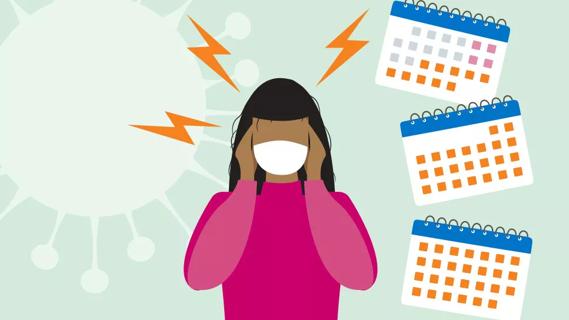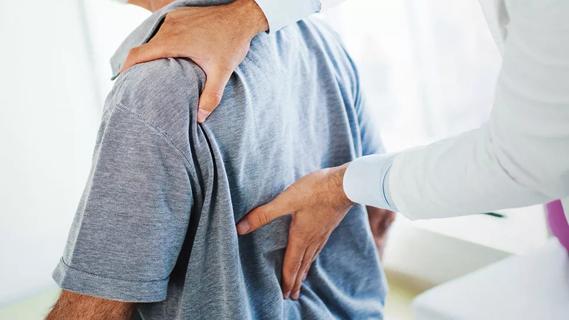Tips to prevent and treat motion sickness

As summer approaches, so does vacation season. What’ll it be this year? Road trips to the beach, skiing in the mountains, cross-country flights to visit family? Planning a trip to a new place can be exhilarating — until you remember that those bumpy car rides and turbulent flights make you feel motion sickness.
Cleveland Clinic is a non-profit academic medical center. Advertising on our site helps support our mission. We do not endorse non-Cleveland Clinic products or services. Policy
Motion sickness is a common disturbance of the balance system, which includes but is not limited to, the inner ear.
“Motion sickness is the nausea, sweating and dizziness some people experience when the balance system is stimulated in an unexpected way,” says neurologist Neil Cherian, MD.
Dr. Cherian offers tips and tricks on how to deal with motion sickness next time you’re away:
Your brain senses movement by getting signals from your ears, eyes, muscles and joints.
“When there’s a disconnect between what our inner ear is telling us, what our eyes see and how we are moving, our brain may not know how to process it,” Dr. Cherian says.
For example, you might become airsick because your eyes cannot see the turbulence that is tossing the plane from side to side.
There is likely a genetic component to motion sickness. According to the Genetics Home Reference Journal, motion sickness tends to cluster in families. If you have a parent or sibling who is highly susceptible to motion sickness, then you are more likely to have motion sickness as well compared to the general public.
Motion sickness can occur with any mode of travel: on a boat, plane, train, bus or car. The choices you make when traveling can help to lessen your chances of feeling ill, so it’s important to choose your seat wisely because where you sit matters.
Being able to predict the physical motion of the vehicle or actually being able to see outside of the vehicle in the direction of travel can often be helpful.
“The most common place to experience motion sickness in the car is in the back seat,” Dr. Cherian says. “The front seat of a car, the forward cars of a train, the upper deck on a boat or wing seats on a plane may give you a smoother ride.”
If possible, lean your head against the headrest to minimize movements and stand up if you feel queasy. It’s also important to avoid distractions like phones, tablets and books. Activities and the outside environment can make a difference.
“Motion sickness can be worsened by reading or using your smartphone or by being on a windy road,” Dr. Cherian says. “Try looking out into the distance, as this can help.”
Don’t forget to fill your belly with the right things before and during travel. In the hours before you travel, avoid alcohol and greasy foods but make sure to drink lots of water and get plenty of rest. While traveling, eat dry crackers and avoid cigarette smoke.
If your child gets motion sickness, be sure to keep plastic bags handy in case they throw up. If they’re over 12 years old, have them ride in the front seat of the car. If they’re younger, have them sit in the middle seat so they can look forward toward the road.
If you suffer from motion sickness, head to your local drugstore and look for over-the-counter antihistamines that can both prevent and treat it. Some of the most common are meclizine (Antivert®, Bonine®), dimenhydrinate (Dramamine®) and diphenhydramine (Benadryl®).
Motion sickness bands and bracelets are also sold over the counter. If you’re looking to go with a non-pharmaceutical route, try using ginger or lavender aromatherapy or acupressure wristbands. However, check with your doctor before using natural remedies.
“The bands and bracelets are based on acupuncture or acupressure points,” says Dr. Cherian. “In some patients, they can be quite helpful. The benefit is that they are cheap because they’re less than $10 for the non-electric version. They also offer a drug-free option.”
People who have motion sickness are also more prone to migraine headaches. Both migraine and motion sickness sufferers tend to share the same symptoms of nausea, dizziness and headaches, according to a study done on the link between migraine and motion sickness.
“Getting optimal treatment for your migraine headaches can sometimes help with motion sickness,” Dr. Cherian says.
If you have severe motion sickness, prescription scopolamine pills or a skin patch are other options. Dr. Cherian recommends applying the patch to the skin behind the ear to help prevent motion sickness for up to three days.
“Motion sickness that starts later in life — after your 20s — may indicate some type of inner ear disorder,” Dr. Cherian says. “Or it could be the result of a pre-existing migraine condition. There are also times, though much less frequently, that it can indicate something more serious.”
Keep a tab on your symptoms. If you’re concerned or your symptoms are severe or bothersome, give your doctor a call.
Learn more about our editorial process.

Exploring mal de debarquement

Eating mindfully, sipping water and chewing slowly can help your brain catch up with your stomach

Seizure symptoms can go far beyond convulsions and may include feelings of déjà vu, temporary confusion and unusual movements

They can feel like a typical headache or a migraine headache, but the pain can last for weeks to months

It’s always a good idea to let a healthcare provider know about any back pain you’re experiencing, especially if it results from trauma or persists longer than three months

It’s all about the amount — try to stick to 100 to 150 milligrams a day to reduce and prevent a pounding, throbbing head

Even one drink can have an impact on your cognitive function leading to slurred speech, blurred vision and impaired memory

Among the options is a fast-acting medication that offers relief in as little as 15 minutes

Your metabolism may torch 1,300 to 2,000 calories daily with no activity

A gentle touch in all the right places may help drain your sinuses